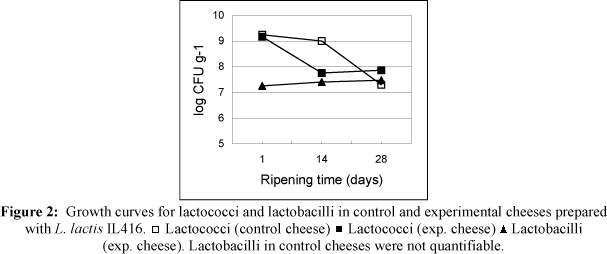Ten strains of lactobacillus from the CNRZ collection were tested as adjunct culture in miniature washed curd cheeses manufactured under controlled bacteriological conditions with two different starters, Lactococcus lactis subsp. lactis IL 416 and Lactococcus lactis subsp. cremoris AM2. Lactobacilli growth seemed to be dependent on the Lactobacillus strain but was not influenced by the starter strain or counts. Lactococci counts were higher in the miniature cheeses with AM2 starter and added lactobacilli than in the control cheeses without lactobacilli. Gross composition and hydrolysis of s1 casein were similar for miniature cheeses with and without lactobacilli. In the miniature cheeses manufactured with IL416 starter, the lactobacilli adjunct slightly increased the soluble nitrogen content, but that was not verified in the AM2 miniature cheeses. Phosphotungstic acid nitrogen content increased in miniature cheeses manufactured with IL416 when Lactobacillus plantarum 1572 and 1310 adjunct cultures were added. That was also verified for several Lactobacillus strains, specially Lactobacillus casei 1227, for miniature cheeses manufactured with AM2 starter. Free fatty acid content increased in miniature cheeses made with lactobacilli adjuncts 1310, 1308 and 1219 with IL416 starter, and with strains 1218, 1244 and 1308 for miniature cheeses with AM2 starter. These results indicate that production of soluble nitrogen compounds as well as free fatty acid content could be influenced by the lactobacilli adjunct, depending on the starter strain.
NSLAB; cheese ripening; biochemistry; proteolysis; lipolysis




